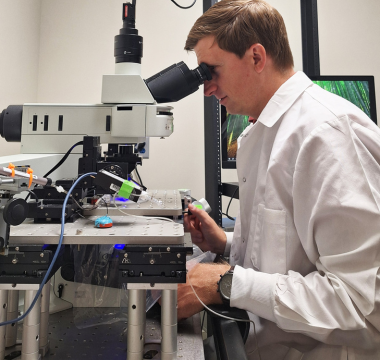My PD Story

Jared Cregg, PhD
2025 Stanley Fahn Junior Faculty Award
Branching Out Toward New Parkinson’s Therapies by Studying the Brainstem
In Parkinson’s disease (PD), specific dopamine-producing neurons in the brain degenerate over time and lead to progressive movement and cognitive symptoms. A multitude of therapeutic research has focused on the impact of losing these neurons on connections within the brain, which has helped develop treatments like dopamine replacement therapy (DRT) and deep brain stimulation (DBS).
While generally effective, these therapies have their limitations and side effects, prompting investigation into alternative treatment strategies. Jared Cregg, PhD, recipient of a Parkinson’s Foundation Stanley Fahn Junior Faculty Award, is exploring how modulating a different area of the brain, the brainstem, could provide new therapeutic potential for those with PD.
The loss of dopamine in PD rewires the circuitry of the brain in several regions critical for movement. Many of these brain areas are highly “plastic,” meaning that they are prone to being rewired, particularly in a disease like PD. However, the circuits within the brainstem produce stable, reflexive motor actions, and Dr. Cregg hopes to leverage the stability of these connections to help restore movement to people with PD.
“This work aims to establish a new framework for treating movement impairments in Parkinson’s disease by shifting focus from traditional targets to the brainstem circuits that naturally govern locomotion.” – Dr. Cregg

From his lab at the University of Wisconsin – Madison, where he is an assistant professor of neuroscience and neurology, Dr. Cregg will first create a biochemical map of two brainstem regions known as the pedunculopontine nucleus (PPN), which regulates movement speed, and the rostral pontine reticular formation (PnO), which regulates turning. This map will then help him to develop tools to selectively target specific neurons in those regions that control these movements in mice.
These tools will enable Dr. Cregg to stimulate these neurons at will. By testing these tools in mice that have Parkinson’s-like symptoms, he can see the potential effects of future therapies that target the brainstem in a similar way. The scientific knowledge gained from these experiments will guide future brainstem-centered PD treatments.
When asked about what this support means to him and his work, Dr. Cregg said “Receiving this award is an incredible honor and a meaningful endorsement of our efforts to chart a new path in Parkinson’s research. By refining these brainstem-based therapies, this work could pave the way for more stable, long-lasting interventions that improve movement in people with PD.”
Meet more Parkinson’s researchers! Explore our My PD Stories featuring PD researchers.
Related Materials
More Stories
from the Parkinson's community


